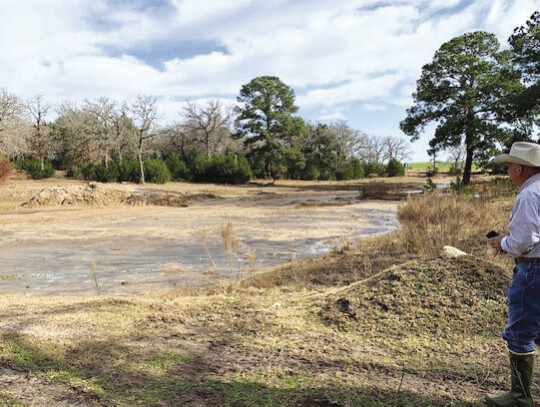A dispute between business neighbors leaves the land damaged
Concerned citizens of Paige, one of Bastrop County’s unincorporated communities east of McDade, fear the potential damage that four new proposed wells will bring to their town’s land, waterways and livestock.
Residents and business owners suggest that a local sod company, Thomas Turfgrass, has been irresponsible with their irrigation practices and water consumption. The business seeks to employ four new wells, but neighbors state that they have already caused significant damage with the lines they currently operate.
The group’s public hearing in front of Lost Pines Groundwater Conseration District has been postponed until Sept. 20.
“I am a rancher. If you ask any rancher, they will tell you we are first and foremost in the grass business. It is our responsibility to be stewards of the land and its resources,” said Diann Watson, who shares a fence line and two creeks with Thoms Turfgrass. “Sadly, my neighbor who is also in the grass business is not proving to be a steward of its 900 plus acres and its resources. Nor are they responsible neighbors.” Watson’s family runs a Brangus cow operation, selling about 50 bulls per year.
Thomas Turfgrass’ wells lie on property lines with neighbors, the water is shared by both parties. As of now the main artesian well is bone dry, according to Watson, which she relies on to water her cattle. The wells are loud and run nonstop, she said.
Watson’s hydrologist indicated that the existing wells, seeping water, streams and creeks will all be affected if the new wells are to be built.
The runoff damage from the excessive irrigation this past year has filled the Kuykendahl creek and the West Yegua creek with sediment and silt. The water that does trickle now is murky, when it used to flow freely and clear, said Watson.
“Watering 24 hours a day, especially when it’s 100 plus degrees outside, is not a responsible way to utilize the aquifer,” she said. “This is a critical water source for ours and our neighbor’s cattle. I can’t even imagine the additional damage four more wells and an additional 3,950 acre feet of irrigation will do.”
Thomas Turfgrass refused to comment when asked.
Interested parties can attend the hearing Sept. 20, at 6 p.m. at the Elgin Library Annex.
.png)





